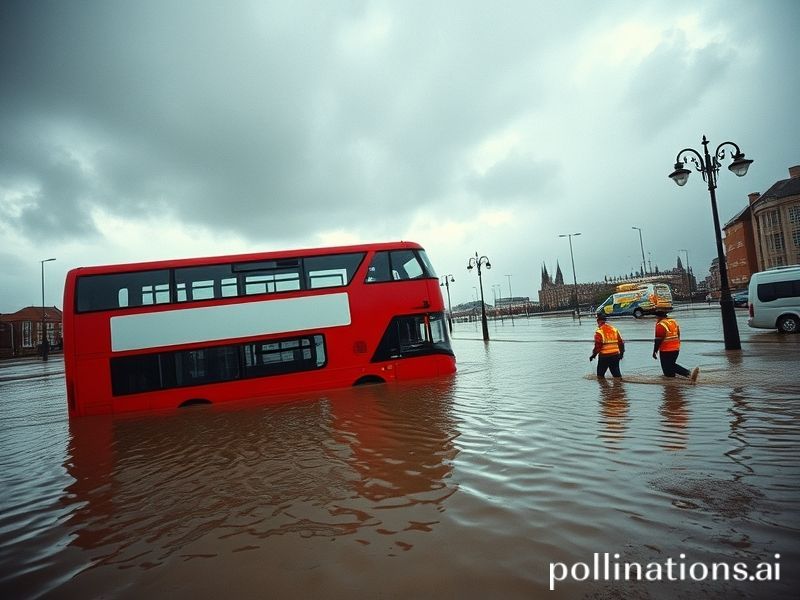Swansea Submarine: How a Welsh City’s Floods Became the World’s Next Climate Omen
Swansea, that stoic Welsh port city once famed for copper and Dylan Thomas’s hangovers, is presently auditioning for the role of Atlantis. Storms straight off the Atlantic have hurled the sea at its doorstep, turning terraced streets into Venetian canals minus the gondolas and romantic lighting. Locals now kayak to the off-licence while council officials tweet #StaySafe from the civic centre, which is itself marinating in shin-deep runoff. It’s a scene as British as soggy chips—only the chips are now floating past the chippy window.
Viewed from the international nosebleed seats, the Swansea inundation is less a local mishap and more a dress rehearsal for the planet’s next act: “Waterworld, But Make It Mundane.” From Jakarta’s sinking skyline to Lagos’s floating slums, coastal cities are discovering that geography class was not a theoretical exercise. Swansea’s soggy carpets simply join a global montage of insurance adjusters in waders, accompanied by the distant sound of reinsurers in Zurich quietly sobbing into their spreadsheets.
The Welsh affair is small by Bangladeshi standards—Dhaka, after all, has learned to schedule monsoon “traffic” the way London schedules rail strikes—but it punches above its weight in symbolism. Britain, the country that taught the world how to industrialise and thus how to burn coal prodigiously, is now receiving the invoice in liquid form. Karma, like Welsh rain, is both relentless and underwhelming in its dramatic timing.
Meanwhile, the global commentariat does what it does best: argue on the internet. American climate influencers post aerial drone shots captioned “This is what happens when you vote Tory,” blissfully ignoring that half of Florida is currently wearing flippers. German engineers propose floating pontoons made of recycled BMW dashboards, because nothing calms rising seas like Teutonic over-engineering. In Beijing, state media notes smugly that Swansea lacks the “social cohesion” to build a proper sea wall—an observation delivered with the same straight face used to describe Xinjiang as a water-park paradise.
Back in the United Kingdom, political reaction has followed the standard three-step choreography: 1) ministers pose in rubber boots for photographs, 2) blame is sprayed like a firehose between Westminster and the Welsh Senedd, and 3) someone suggests a feasibility study that will report back circa 2047, by which time property values will be measured in barnacles per square metre. The current prime minister, whose climate credentials include once re-tweeting a photo of a wind turbine, has pledged “whatever it takes,” a phrase that historically translates to “whatever fits in tomorrow’s headlines.”
For the global economy, Swansea’s soggy notebooks offer a parable in municipal debt. The city’s council has already spent its annual emergency budget on sandbags that are now drifting toward Ireland. This places Swansea in the same widening club of cities—Venice, New Orleans, Rotterdam—that must choose between multi-billion-pound flood defences or the cheaper option of gradually converting ground floors into aquariums. Bond markets, ever the sentimental romantics, have responded by nudging Welsh debt spreads wider, which is financier-speak for “nice place, shame if something happened to it.”
And yet, amid the damp despair, a certain human comedy bubbles up. Swansea Market now trades in designer wellington boots hand-painted with daffodils. A local brewery has launched “Brine Ale,” marketed as “slightly saltier than our usual bitterness.” Even the city’s famous swans—those pampered mascots—have taken to the streets, gliding past traffic lights with the regal indifference of creatures that always knew land was a temporary arrangement.
In the end, the floods will recede, insurance premiums will rise like yeast, and somewhere a consultant will invoice for a PowerPoint titled “Resilience Strategy.” Swansea will dry out, towel off, and wait for the next atmospheric river to roll in from the west. The rest of the world will watch, tweet, and pretend the water stops at someone else’s shoreline—until, of course, it doesn’t. As the Welsh say, “dyfal donc a dyr y garreg”: tap a stone long enough and it cracks. Tonight, the stone is underwater and the tapping sounds suspiciously like rain.







